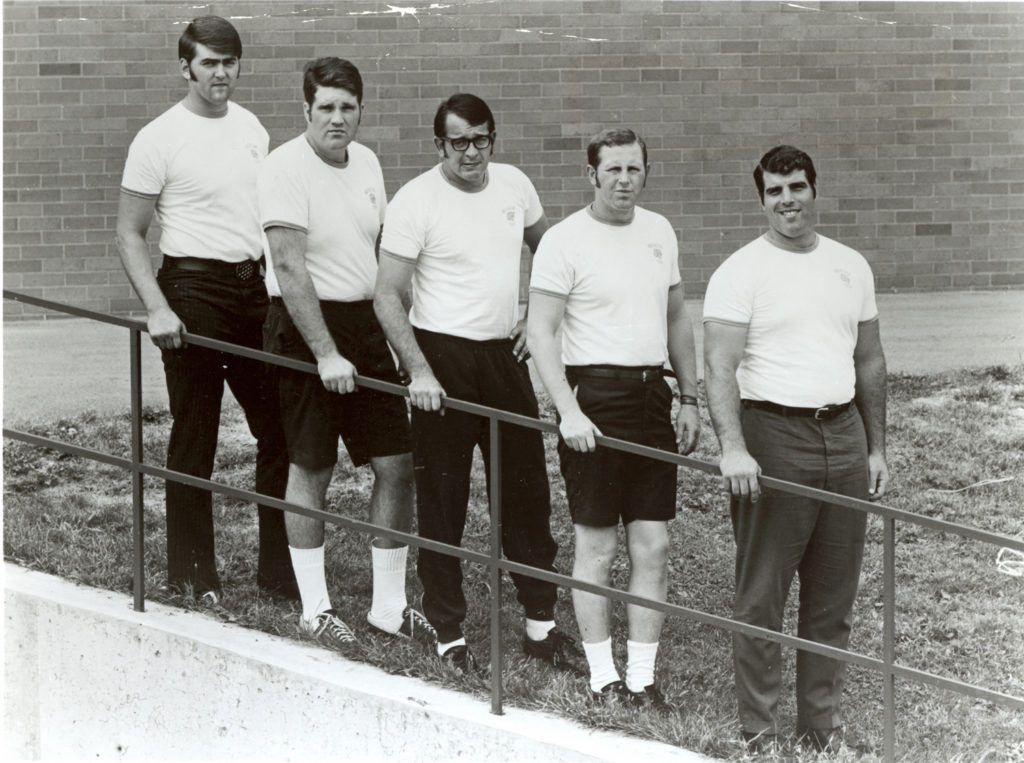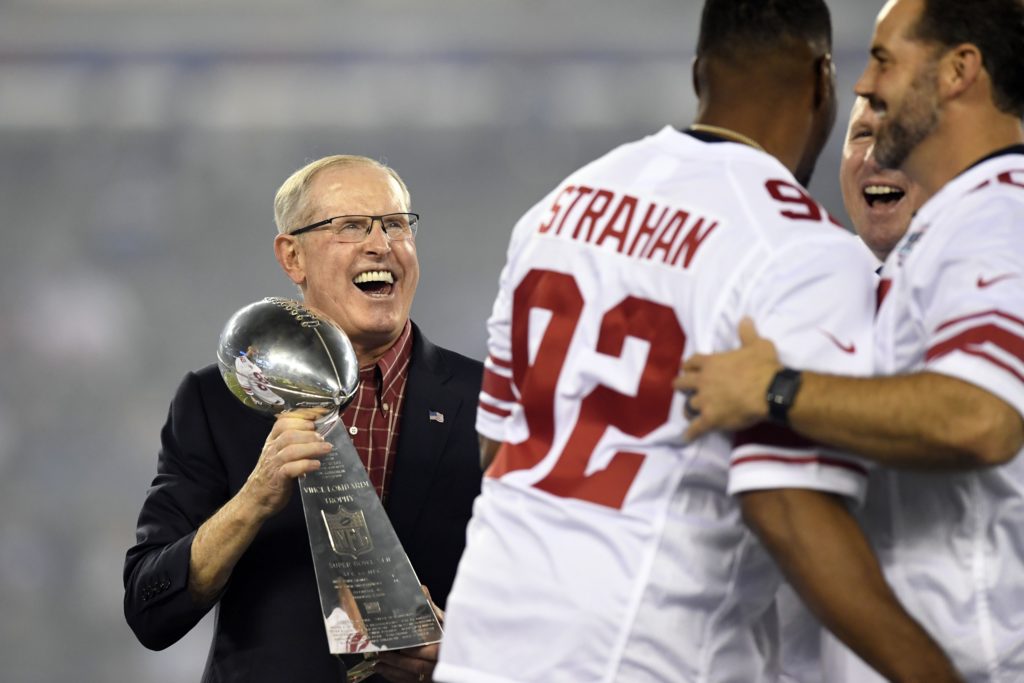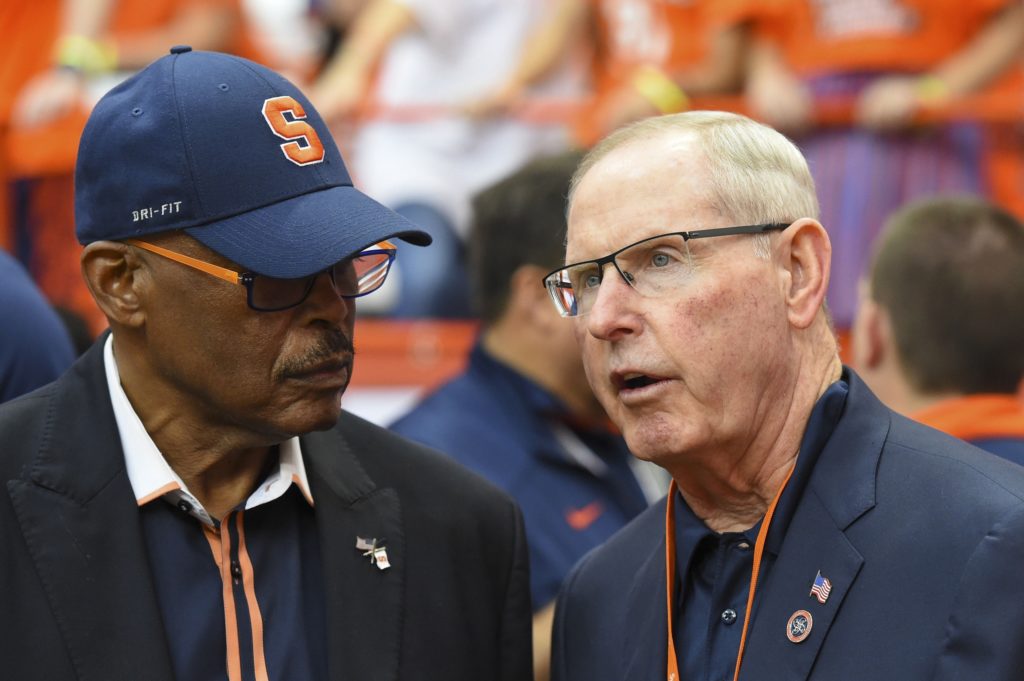
By CHUCKIE MAGGIO
Richard Knaack and his friends enthusiastically strode into the 208,000-foot facility that was doubling as the most euphoric workplace in the United States. They were invited by the Tri-State Area’s most popular leader, a man whose approval rating surpassed those of George Bush, Eliot Spitzer or Jon Corzine.
To America, he was the giant slayer who helped render one of the most dominant years in sports history nearly irrelevant. To the men who visited him in East Rutherford in the middle of February 2008, he was just Coach Coughlin.
Decades before New York Giants quarterback Eli Manning tossed the pass that denied the New England Patriots perfection and earned Tom Coughlin his second Super Bowl ring, Coughlin began his coaching career at the Rochester Institute of Technology. The Tigers were a club squad, teeming with enthusiasm but lacking resources. Coughlin’s tenure produced the school’s first varsity outfit and formed lifetime bonds he and his players still cherish 50 years after his first training camp.
Coughlin, upon graduating from Syracuse University in 1969, was connected to RIT by head basketball coach Bill Carey. Carey was Coughlin’s basketball and baseball coach at Waterloo High School and recommended his former point guard and catcher to athletic director Lou Alexander Jr.
Alexander shared the school’s vision of a near-future move to Division III, where the Tigers would join a conference with established programs including Alfred, Ithaca and St. Lawrence. Coughlin would teach physical education and spend a year as an assistant under head coach Ken Davis. In 1970, the program would be his.
“The idea of going there, working a year as an assistant and then becoming the full-time head coach, the only football coach in the physical education department, that was the lure,” Coughlin said of the opportunity.
Even as the head coach, Coughlin paid his dues. Being the only full-time member of the staff involved cooking his players’ meals, buying equipment, scheduling all aspects of the season, washing water bottles and even finding a fraternity house for the team to stay during the preseason. “Everything you had to do,” Coughlin recalled, “I did it.”
Coughlin’s reputation as a strict disciplinarian was born in the Flower City. The team was required to wear a dress shirt and tie to away games. Coughlin and his assistants conducted bed checks during preseason to ensure players didn’t break curfew. Practices followed a rigid schedule and unexcused tardiness was punished.
“I was in my third year of engineering school and hadn’t played since my senior year in high school,” Pat Muscarella, one of the squad’s top rushers, noted. “The first meeting he seemed over the top from what I was expecting, stressing every point he was making extremely hard… The first practice was also pretty intense and difficult, as I was not in the best of shape. I made it through okay but knew a large number of guys would not return, and they didn’t.”
Players quickly respected Coughlin, who showed legendary Packers coach Vince Lombardi’s sales training films in team meetings as a motivational technique and stressed attention to detail in his gameplans. Beyond football, he ingrained valuable life lessons in his players, who appreciated his confidence in their abilities and commitment to honest dialogue.
RIT’s board of trustees approved varsity football in April 1971. The Tigers played their first varsity game on Nov. 13, the last game of their campaign, dropping a 29-10 contest to visiting Brockport. The undermanned Tigers, who were limited to just 22 rushing yards, missed four transfer students who were ineligible to play on the varsity level. They also threw three interceptions and lost four fumbles, an inauspicious way to start a legendary coaching career.
“You might say night and day,” Coughlin said of the shift to varsity ball. “Because of scheduling we were not able to play all of the Independent Collegiate Athletic Conference opponents. We had to wait, but we played Ithaca, Alfred, Hobart and the change was night and day. You had some of the finest, highly recognized Division III coaches in the country. At Ithaca you had Jim Butterfield; Hobart College was George Davis and Alfred was Alex Yunevich. Those were three predominant names in small college football, and they were the people I was in immediate competition with.
“It was a great experience for me. The whole RIT experience was one of tremendous knowledge and learning because I would become the head coach of a national expansion team with the Jacksonville Jaguars in 1994, and just like RIT we basically started from scratch… I did everything and by doing it all, it set me up for success later on in my career.”
Competing against established programs required profound patience and meticulous coaching. Though Coughlin built equity on the recruiting trail and welcomed skilled athletes, the Tigers’ offensive and defensive lines were both undersized and RIT didn’t provide athletic scholarships. Starters were often charged with playing a full game at positions where the roster lacked depth, while Hobart and Ithaca garnered more financial support.

“I remember how serious he was and came across as a sincere gentleman,” Knaack commented. “It was very clear that things wouldn’t be easy. I respected Coach immediately.”
Budget notwithstanding, RIT compiled a 16-15-2 record in Coughlin’s four seasons at the helm. Even though a half-century has passed, Coughlin still pridefully reminisces on the Tigers defeating Utica 21-6 in his debut and tying Hobart 13-13 in 1973 after suffering a 67-13 drubbing the year before.
“Coughlin was convinced we should have been competitive and were just as good,” Muscarella remarked about the Hobart clash. “Most of us thought he was nuts. He did convince us and we tied them… Or as he said, ‘They tied us!’ Greatest sporting event I ever participated in.”
Coughlin understood that his players signed up for the love of the game and carried the optimistic demeanor he showcased against Hobart to daily practices. The silver lining in defeat, he told them, was the opportunity to compete and develop against skilled opponents. He got down about losing, he acknowledged, but he didn’t allow the team to see him discouraged. “I couldn’t afford it,” he said. “Football is not an easy game. You make the commitment and it’s tough.”

Winning wasn’t always the main priority for those Tiger teams, but Coughlin always coached to win. To Knaack, the starting quarterback, there was no better example than a miserable Saturday in the Southern Tier.
“We were playing St. Bonaventure in a downpour,” Knaack said. “We had just scored and I needed to dry my hands to hold for the extra point. We had run out of towels, so Coach took his shirt off and gave it to me to use as a towel.”
The varsity program lasted just four more years after Coughlin returned to his alma mater to coach quarterbacks and eventually earn a promotion to offensive coordinator. RIT cut its most expensive team after the 1977 season.
Coughlin won a Super Bowl as the Giants wide receivers coach under Bill Parcells, which prepared him for the Boston College head coaching job. He led BC to 21 wins in three seasons, none bigger than a 41-39 victory over No. 1 Notre Dame in South Bend in 1993, BC’s first-ever win over the Irish. He assumed the Jaguars position for the 1995 season and coached Jacksonville for eight seasons. He was hired in New York in 2004.
The men Coughlin coached in his tenure keep the memory of the team’s best days alive, from large viewing parties to watch the Giants win Super Bowls XLII and XLVI to the reunion six of them had at the Giants facility to eat lunch, provide life updates and hearken back to their time in Henrietta.
“The connection was still very much there,” Coughlin reflected. “I always carry with me the love of the game. That’s what it meant for me to watch those kids play… My favorite memories were those of the athletes I had the privilege to coach.”
“He’s a great man,” Knaack said. “It was an honor to play for him.”





Leave a Reply